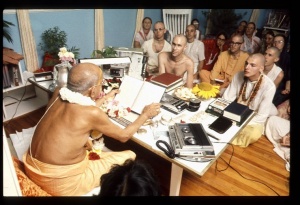CC Madhya 24.112 (1975): Difference between revisions
(Vanibot #0027: CCMirror - Mirror CC's 1996 edition to form a basis for 1975) |
(Vanibot #0020: VersionCompareLinker - added a link to the Version Compare feature) |
||
| Line 2: | Line 2: | ||
<div style="float:left">'''[[Sri Caitanya-caritamrta (1975)|Śrī Caitanya-caritāmṛta (1975)]] - [[CC Madhya (1975)|Madhya-līlā]] - [[CC Madhya 24 (1975)|Chapter 24: The Sixty-One Explanations of the Atmārāma Verse]]'''</div> | <div style="float:left">'''[[Sri Caitanya-caritamrta (1975)|Śrī Caitanya-caritāmṛta (1975)]] - [[CC Madhya (1975)|Madhya-līlā]] - [[CC Madhya 24 (1975)|Chapter 24: The Sixty-One Explanations of the Atmārāma Verse]]'''</div> | ||
<div style="float:right">[[File:Go-previous.png|link=CC Madhya 24.111 (1975)|Madhya-līlā 24.111]] '''[[CC Madhya 24.111 (1975)|Madhya-līlā 24.111]] - [[CC Madhya 24.113 (1975)|Madhya-līlā 24.113]]''' [[File:Go-next.png|link=CC Madhya 24.113 (1975)|Madhya-līlā 24.113]]</div> | <div style="float:right">[[File:Go-previous.png|link=CC Madhya 24.111 (1975)|Madhya-līlā 24.111]] '''[[CC Madhya 24.111 (1975)|Madhya-līlā 24.111]] - [[CC Madhya 24.113 (1975)|Madhya-līlā 24.113]]''' [[File:Go-next.png|link=CC Madhya 24.113 (1975)|Madhya-līlā 24.113]]</div> | ||
{{CompareVersions|CC|Madhya 24.112|CC 1975|CC 1996}} | |||
{{RandomImage}} | {{RandomImage}} | ||
==== TEXT 112 ==== | ==== TEXT 112 ==== | ||
<div class="verse"> | <div class="verse"> | ||
: | :"muktā api līlayā vigrahaṁ | ||
:kṛtvā bhagavantaṁ | :kṛtvā bhagavantaṁ bhajante" | ||
</div> | </div> | ||
| Line 25: | Line 24: | ||
<div class="translation"> | <div class="translation"> | ||
" 'Even a liberated soul merged in the impersonal Brahman effulgence is attracted to the pastimes of Kṛṣṇa. He thus installs a Deity and renders the Lord service.' | |||
</div> | </div> | ||
| Line 32: | Line 31: | ||
<div class="purport"> | <div class="purport"> | ||
Highly elevated Māyāvādī sannyāsīs sometimes worship the Rādhā-Kṛṣṇa Deity and discuss the pastimes of the Lord, but their purpose is not elevation to Goloka Vṛndāvana. They want to merge into the | Highly elevated Māyāvādī sannyāsīs sometimes worship the Rādhā-Kṛṣṇa Deity and discuss the pastimes of the Lord, but their purpose is not elevation to Goloka Vṛndāvana. They want to merge into the Lord's effulgence. This statement is quoted from Śaṅkarācārya's commentary on the Upaniṣad known as Nṛsiṁha-tāpanī. | ||
</div> | </div> | ||
Latest revision as of 15:04, 27 January 2020
Śrī Caitanya-caritāmṛta (1975) - Madhya-līlā - Chapter 24: The Sixty-One Explanations of the Atmārāma Verse

His Divine Grace
A.C. Bhaktivedanta Swami Prabhupada
A.C. Bhaktivedanta Swami Prabhupada
TEXT 112
- "muktā api līlayā vigrahaṁ
- kṛtvā bhagavantaṁ bhajante"
SYNONYMS
muktāḥ—liberated; api—although; līlayā—by pastimes; vigraham—the form of the Lord; kṛtvā—having installed; bhagavantam—the Supreme Personality of Godhead; bhajante—worship.
TRANSLATION
" 'Even a liberated soul merged in the impersonal Brahman effulgence is attracted to the pastimes of Kṛṣṇa. He thus installs a Deity and renders the Lord service.'
PURPORT
Highly elevated Māyāvādī sannyāsīs sometimes worship the Rādhā-Kṛṣṇa Deity and discuss the pastimes of the Lord, but their purpose is not elevation to Goloka Vṛndāvana. They want to merge into the Lord's effulgence. This statement is quoted from Śaṅkarācārya's commentary on the Upaniṣad known as Nṛsiṁha-tāpanī.